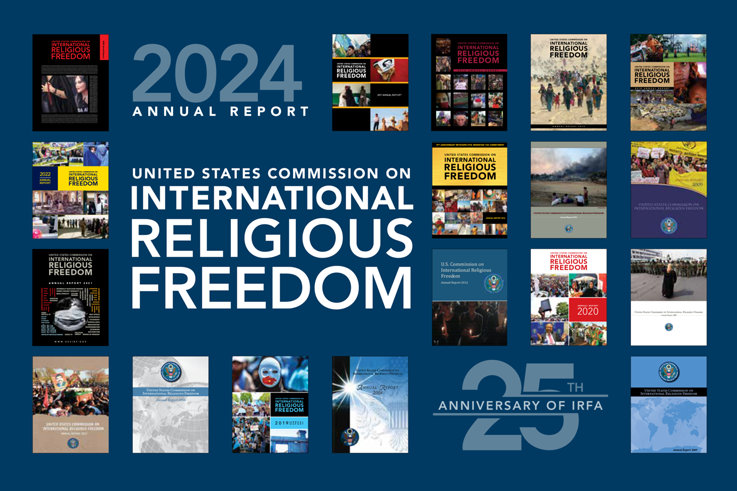
-
HOME
-
WHAT IS STANDOur Mission Our Values Our Help Contact
-
WHAT WE FIGHT FORReligious Freedom Religious Literacy Equality & Human Rights Inclusion & Respect Free Speech Responsible Journalism Corporate Accountability
-
RESOURCESExpert Studies Landmark Decisions White Papers FAQs David Miscavige Religious Freedom Resource Center Freedom of Religion & Human Rights Topic Index Priest-Penitent Privilege Islamophobia
-
HATE MONITORBiased Media Propagandists Hatemongers False Experts Hate Monitor Blog
-
NEWSROOMNews Media Watch Videos Blog
-
TAKE ACTIONCombat Hate & Discrimination Champion Freedom of Religion Demand Accountability
USCIRF Annual Report Exposes Egregious Abuses of Religious Freedom
On May 1, the United States Commission on International Religious Freedom (USCIRF) presented its annual report on the worldwide state of religious freedom.

The nine-member nonpartisan commission established by an act of Congress summarized the main points of this year’s 102-page report. Each commissioner addressed a particularly egregious hotspot, detailing that nation’s violations and recommending that it be designated a Country of Particular Concern (CPC) by the Secretary of State and, therefore, subject to potential sanctions by the U.S.
“We continue to believe that the U.S. government can do more to address the most egregious abuses.”
Commissioner David Curry, for example, spoke about India’s national, state and local level restrictions on religious freedom, stifling Muslims, Christians and Sikhs, among others. Curry pointed to the destruction of more than 500 churches and two synagogues in India. He also cited the Indian government’s harmful targeting of activists, journalists, academics and abroad. The most extreme example occurred when, this past November, the U.S. Justice Department alleged that the Indian government was involved in an assassination attempt on a Sikh activist in New York who is an American citizen. “We are deeply disappointed that the State Department did not recognize India as a CPC in 2023, despite the country clearly meeting the standards under the International Religious Freedom Act,” Curry said.
Commissioner Nury Turkel covered China, saying, “China is the world’s most sophisticated and far-reaching perpetrator of transnational repression.” Turkel detailed China’s subjecting of Uyghur Muslims and others to forced sterilization, forced abortions and forced intermarriage in a continuing campaign of genocide.
But China’s suppression of religion extends beyond its borders, encompassing the U.S., Japan, South Korea and Thailand, among others. The Chinese government operates over 100 overseas police stations in at least 53 countries, Commissioner Turkel explained. In April 2023, the U.S. Justice Department arrested and charged individuals operating an illegal Chinese police station in New York City. Moreover, the Chinese government and entities acting on its behalf have hired former U.S. officials and former members of Congress to lobby on their behalf. As the report states, “It is imperative to ban lobbying for the Chinese government, its state-affiliated commercial entities, and their interests while the government continues its egregious acts of religious persecution.… Congress cannot look the other way. For the good of our country and religious freedom worldwide, Congress must ban lobbying for the Chinese government and its interests.”
Commissioner Eric Ueland spoke on Nigeria, citing the continuing deteriorating conditions for people of faith. Mass violence, killings and enforcement of blasphemy laws persist. Each year since 2009, USCIRF has urged that Nigeria be designated a CPC. The State Department finally did so in 2020 but then withdrew the designation in the following three years, though the human rights situation has become increasingly dangerous in Nigeria. Ueland also took time to spotlight another deteriorating situation, Nicaragua, where the government “arbitrarily arrests, imprisons and expels clergy and lay people. The most prominent example is Bishop Rolando Alvarez, who was sentenced to 26 years imprisonment on spurious charges in February 2023 and exiled to the Vatican in January of this year.” Ueland also spoke of 11 pastors arrested on dubious money laundering charges who were sentenced to 12 to 15 years of incarceration. USCIRF also recommends that Nicaragua be labeled a CPC.
Commissioner Mohamed Magid spoke of the rise of antisemitism and Islamophobia, as well as attacks on protected religious sites and places of worship. Anti-Muslim hate and antisemitism have led to harassment of both communities throughout the world, Magid said, while in Sudan, mosques and Coptic churches have been attacked.
Speaking generally, Commissioner Susie Gelman said, “We continue to believe that the U.S. government can do more to address the most egregious abuses. For example, we continue to urge the administration to use the CPC designation tool more effectively. Too many of the State Department’s CPC countries are repeatedly named as such each year, but the designations result in little to no substantive change. Accordingly, we recommend that the State Department implement meaningful consequences on violator governments when it names its CPCs.” Gelman cited Pakistan, Saudi Arabia, Tajikistan and Turkmenistan as examples of CPCs that have avoided penalties in spite of their serious abuses of religious freedom.
USCIRF Chair Abraham Cooper spoke of the personal stake some of the commissioners have in the state of religious freedom in the world. “We talk about 28 countries, but when we talk about China, we think of Nury’s mother,” he said, referring to Commissioner Turkel’s mother, a Uyghur Muslim trapped in China who has suffered imprisonment and continues to endure abuse because of her faith. “When we speak about Sudan and the utter absurdity of the return of genocidal hate and violence in that country, we think and pray for Imam Magid’s family, some of whose members have been killed. If it sounds like it’s personal, it is. We certainly hope that those of you watching this presentation won’t be disheartened, but rather will be energized to make a difference.”
In conclusion, Cooper addressed what he said is the first question asked of him and his fellow commissioners by representatives of other countries when they sit down to talk about the state of religious liberty in their nations: “‘Who are you as Americans to point the finger at us, when you have so much hate and so much religious hatred and targeting of minorities in your own country?’ It’s a fair question,” Cooper said. “It’s something that we each will grapple with every day. But we can also point to the fact that, as the world’s greatest democracy, the way in which we deal with hate is we confront it. We don’t sweep it under the rug.”






